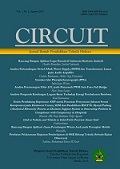Penggunaan Metode Problem Based Instruction (pbi) Untuk Meningkatkan Hasil Belajar dan Motivasi Siswa Pada Materi Pengukuran Nilai Resistor Kelas X Di SMK Negeri 1 Darul Kamal Aceh Besar
DOI:
https://doi.org/10.22373/crc.v2i1.3259Keywords:
PBI, Motivation, activity, student, teacherAbstract
Based on the observation result, the learning system applied in SMK Negeri 1 Darul Kamal Aceh Besar, is more dominated by conventional learning. Therefore, the student activity tends to be passive. However, in the process of learning the student is less understanding the material provided by the teacher. One of the alternatives to solving the problem is by offering a PBI learning method. The purpose of this research is to know the improvement of student learning motivation after learning by using PBI learning method. This research was carried out on November 13-15, 2017. The design of this research uses a real experimental research design. The population in this study is all students of SMKN 1 Darul Kamal which amount to 198 students, while the sample in this research is 22 students of class X Electronics. Technique of collecting data used observation and motivation questionnaire. Observation results showed significant improvement using RPP I, RPP II and RPP III, both observing the ability of teachers to manage learning and student activity observation. Teacher observation results at first meeting with total value of 80.62%, at second meeting with 81.85% and third meeting result increasing up to 85%. Similarly, student activity observation result from 76.42%, to 79.28%, even up to 84.28%. The result of the research by using motivation questionnaire shows that the average value of experimental class is 87,4%. Based on the result of the research, it can be concluded that the use of learning method of PBI can increase students' motivation to learn "resistor value measurement" in class X Electronic SMKN 1 Darul Kamal Aceh Besar.Downloads
Published
2018-07-17
Issue
Section
Articles
License
Authors who publish in CIRCUIT: Jurnal Ilmiah Pendidikan Teknik Elektro agree to the following terms:
- Authors retain copyright and grant the journal right of first publication with the work licensed under a Creative Commons Attribution-ShareAlike 4.0 International License (CC BY-SA 4.0) that allows others to share and adapt the work with an acknowledgement of the authorship and initial publication in this journal
- Authors are able to enter into separate, additional contractual arrangements for the non-exclusive distribution of the journal's published version of the work (e.g., post it to an institutional repository or publish it in a book), with an acknowledgment of its initial publication in this journal.
- Authors are permitted and encouraged to post their work online (e.g., in institutional repositories or on their website) prior to and during the submission process, as it can lead to productive exchanges, as well as earlier and greater citation of published work. (See The Effect of Open Acces)

